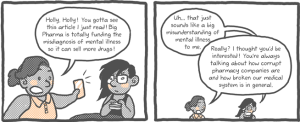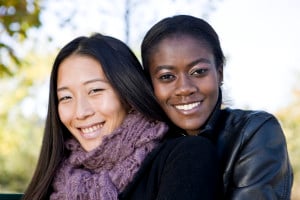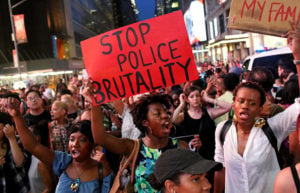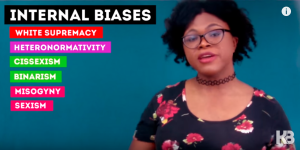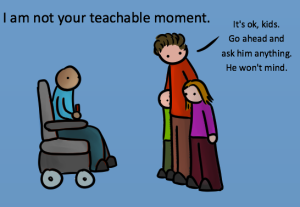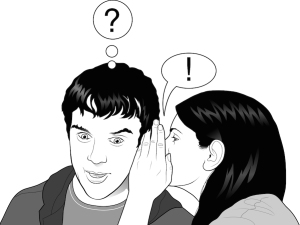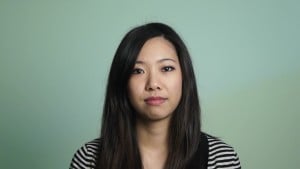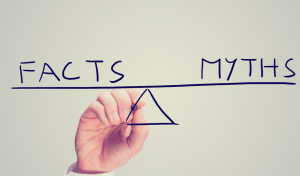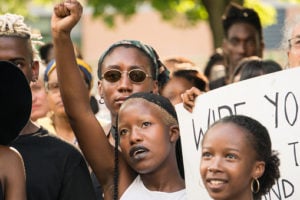Originally published on The Establishment and republished here with their permission.
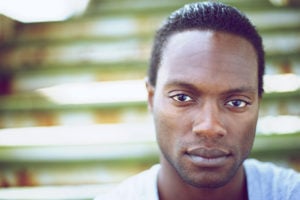
Close up portrait of a person with a serious expression.
(Content Note: mentions of race-based violence, outing)
Living most of my life as a Black boy, raised by Black women, I was instilled with an appreciation and respect for women.
I was never taught there was something a woman could not do, nor was there anything I shouldn’t be expected to do as a boy. In a society that actively erases non-binary people and experiences, I wasn’t actively taught full a/gender equality, but I picked that up along the way, too.
The idea of a/gender equality never felt like a hard thing to wrap my head around. But in the popular conversation, a/gender equality and feminism are so geared toward white sensibilities that people like me aren’t only marginalized as allies, but actively endangered.
In short, though I’ve always supported equality, I find myself scared of white women.
And this conversation – one about white women feminists and their collective relationship to Black people – is a specific one worth having. There are other discussions to be had in regards to the complex interplay of race, a/gender, and other social locations. But here, I want to focus on how the construction of white womanhood (and feminism’s wielding of it) specifically affects me, as a Black man, and others like me.
In her book Words of Fire: An Anthology of African-American Feminist Thought, Black feminist scholar Beverly Guy-Sheftall writes: “The history of American feminism has been primarily a narrative about the heroic deeds of white women.”
The Suffragettes, some of American feminism’s first historical icons, found coalition by excluding Black women from their movement in order to make their demands for justice more appealing.
In a contemporary context, notable white feminists are consistently absent when Black women face misogyny under the public gaze (see: the white cast of Ghostbusters staying publicly silent about Leslie Jones’ online abuse).
This kind of willful ignorance directly affects Black women, femmes, and those who are non-binary.
There is a wealth of work by Black women on the way white women wield this type of violence against them. But white women have also weaponized whiteness against Black men and other men of color in a way that exploits racist cultural ideas of criminality.
On an institutional level, protecting white women often comes at the expense of Black men. In 2014, Hollaback!, a nonprofit to end harassment in public spaces, released a viral video depicting a white-appearing woman getting harassed almost exclusively by Black and Latino men.
After the Internet let them have it, chapters of the organization disassociated and rebranded to be more intentional about the racial implications of public harassment. Hollaback! had already come under fire in 2013 for its association with then-mayoral candidate Christine Quinn, who supported “stop and frisk” policing. In the eyes of Hollaback!, with its focus on the safety of white women, stop and frisk evidently doesn’t qualify as “street harassment.”
It’s dangerous to use white women as the only measures of public safety, particularly in this time of abject public violence against Black people. This narrative of “the terrifying Black man” has fueled decades of legislation, while establishing credibility for any white woman’s testimony of indiscretion.
My education has been in predominantly white institutions since high school, so I’ve also seen this violence up close.
I think of the white girl who outed me freshman year of boarding school in front of my entire theater group, causing an audibly and embarrassing groan from the gawking older girls. At the intersection of sexuality and race, I found that my interpersonal relationships to white women required a muddling of my identity. I’ve met white women who have “gotten past” my Blackness because of my queerness, and white women who have claimed they found me easier to engage with than other Black people.
I have found white women able to compartmentalize my identity to suit them. Under this strange gaze, I saw white girls get away with arbitrary racism without scrutiny. Like their celebrity counterparts (Taylor Swift, Amy Schumer, Sarah Silverman, and so on), they are praised and protected by racism sold as feminism. White women use their own oppression, by white men, to absolve them from accountability.
I can’t help but think of Emmett Till, who allegedly whistled at a white woman and was murdered for it. I think of all the white women who have physically accosted me in bars, in the street, in my own home. I think of how I have virtually no way to set a boundary safely.
I think of the white woman who literally ran from me after noticing me, a half block behind her, on the way to work (we worked on the same floor, to her surprise and dismay). I think of how my co-workers convinced me it wasn’t intentional. This is in no way to deny the real fear of street harassment; it is an interrogation of how white women can defensively weaponize their fear.
White women’s fear is considered more important than Black men’s lives, and ignoring this could have widespread consequences.
For instance, there’s a tenacious argument that hiring more women cops might be a potential solution to police violence. Studies show that women cops are less likely to use excessive force, and are more likely to build community and decrease sexual harassment among their precincts. But these findings elide the ways that hiring more white policewomen could affect Black people’s safety – and Black men’s in particular.
Consider officer Betty Shelby, the white woman charged with manslaughter in the death of Terence Crutcher. In the days after the shooting, media articles excused her by painting her as a victim in the incident, citing a temporary health problem.
We have seen this narrative again and again from police apologists, yet white feminists defended Shelby as a gender martyr, completely derailing the discussion of state-sanctioned brutality. Supporters claimed that Shelby was only charged because she was a woman. While most cops involved in fatal shootings are never charged or reprimanded from their positions (paid leave doesn’t count), Officer Shelby isn’t the first.
This criticism is a racist smokescreen, and shows that increasing white women on the police force would be used to excuse violence against Black men, not improve it.
***
The tyranny of white women’s dominance already pervades our culture.
I think of Madonna forcing a make-out with Drake on stage, then shaming of him for it (this is the same Madonna who called her Black son a “n-gga”). I think of the voyeurism of Jennie Livingston’s Paris Is Burning and how it still solidified her in Black Queer history, despite the systemic violence that killed a majority of its subjects. I think of white women consistently playing Asian characters, under some guise of relatability.
White feminism can hold these acts as cultural accomplishments, but only at the cost of Black people and other people of color. The toxicity of this power can be best exemplified by the most recently controversy surrounding white writer Lena Dunham and Black athlete Odell Beckham, Jr.
Dunham, in her weekly feminist newsletter, shared some seriously projective thoughts about an interaction she had with Odell Beckham, Jr., New York Giants wide receiver. At the (massively attended) Met Gala, Dunham believed that Beckham was ignoring her by being on his phone, an act she saw as a repulsed dismissal of her womanhood.
In her apology, she claims vanity as a defense for feeling insecure in that fashion industry space. But the issue here is not Dunham’s insecurity; there are vicious and nuanced mandates placed on women’s bodies.
Still, she is able to make an assailant out of a Black body, simply for it being in her company and defend herself by claiming a familiar victimhood. I think of Odell sitting at the Met Gala, definitely unaware that he was being consumed and vilified for simply being alive, yet not at the grace of Dunham’s attention.
The feeling I have toward white women is a malleable kind of terror. In the popular science of fear, we understand two immediate responses: flight or fight. When faced with innocent or malicious interactions with white women, I have learned that neither are readily appropriate. It is not that I am so readily offended by their presence, but it is this disarming inability to defend myself when met with their violence.
I know this fear I feel is historic. I see how the white woman’s scope of the Black or Brown body could literally mean death.
[do_widget id=’text-101′]
jayy dodd is a writer, editor, and artist from Los Angeles, now based in a Detroit. Their work has been featured in Huffington Post, Guernica, Preludes, Lamda Literary, Blavity, and more. They are the author of Mannish Tongues, forthcoming from Platypus Press in February 2017.
Search our 3000+ articles!
Read our articles about:
Our online racial justice training
Used by hundreds of universities, non-profits, and businesses.
Click to learn more






